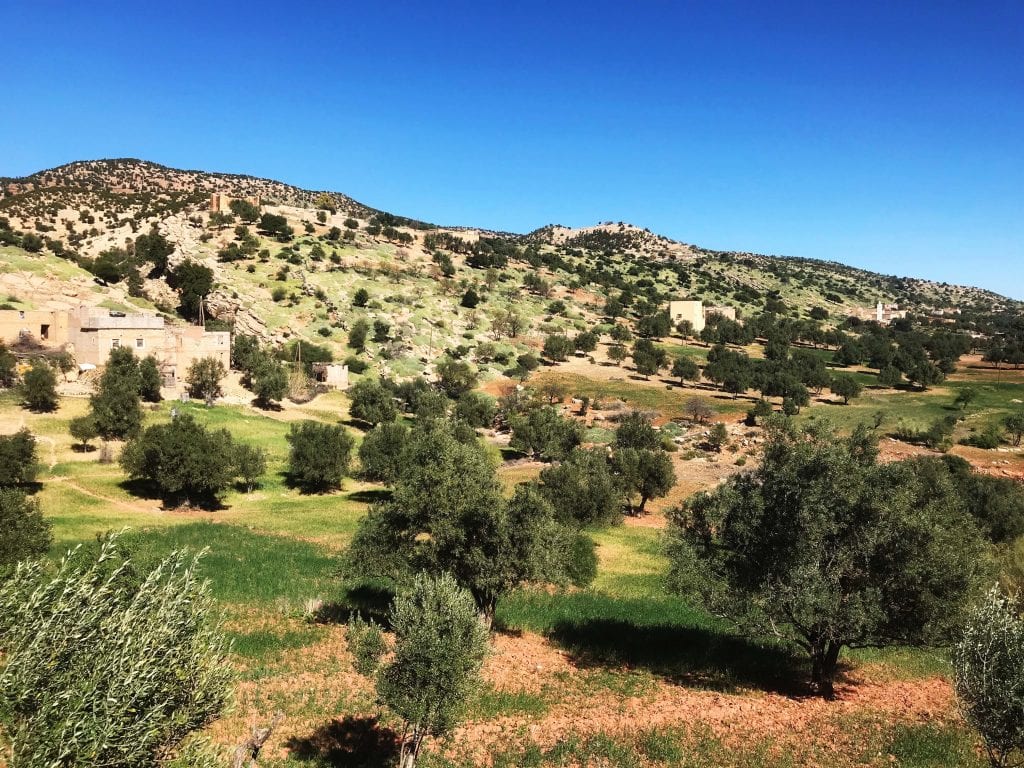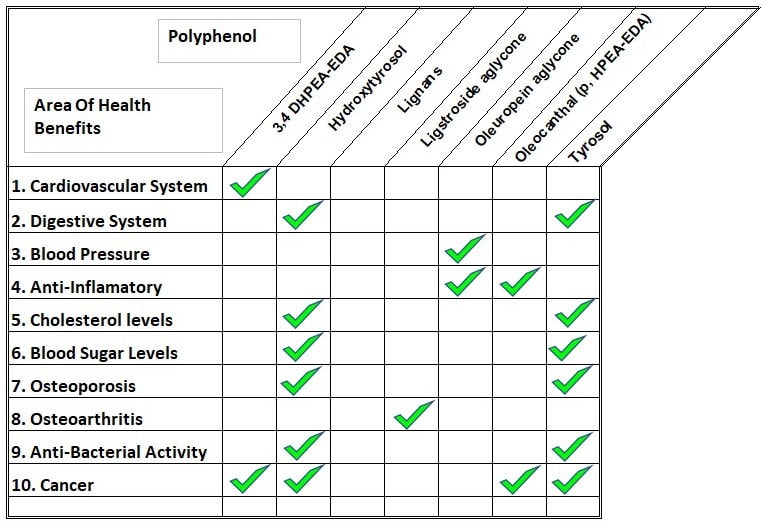Why extra virgin olive oil is the best olive oil you can buy and how polyphenols deliver the many health benefits of olive oil.
Updated September 30th 2021

Summary
- Extra virgin olive oil is very healthy. In fact, it is the healthiest of all olive oils and provides a range of benefits. Before we get into the specifics of olive oil and healthiness let’s get some background about at what extra virgin olive oil is, how it is produced before getting on to the reasons why it is so good for you and its specific health benefits.
Contents
- Introduction
- First Of All – What Is Extra Virgin Olive Oil?
- Best Extra Virgin Olive Oil Is Single Estate :
- Extra Virgin Olive Oil Production :
- Why Choose Extra Virgin Olive Oil?
- Extra Virgin Olive Oil For Health & Wellbeing
- What Makes Extra Virgin Olive Oil So Healthy?
- What Are Polyphenols?
- What Makes Morocco Gold Extra Virgin Olive Oil So Special?
- Types Of Polyphenols
- Morocco Gold Extra Virgin Olive Oil Is High In Polyphenols
- What Conditions Can Extra Virgin Olive Help To Alleviate?
- Extra Virgin Olive Oil May Help Protect Against Covid
- Extra Virgin Olive Oil Benefits Your Immune System
- Healthy Compounds In Extra Virgin Olive Oil Still Present After Exposure To Heat
“Let food be thy medicine and medicine be thy food”
Hippocrates : father of modern medicine
Introduction
What Is Extra Virgin Olive Oil? – Extra virgin olive oil is a wholly natural, unrefined oil and the highest quality olive oil you can buy. How the fruit was grown, harvested and transported, how it was pressed into oil, and how the oil was packaged and bottled all contribute to ensure extra virgin olive oil like Morocco Gold is the best quality extra virgin olive oil.
What Makes Extra Virgin Olive Oil So Healthy? – The biggest thing that makes extra virgin olive oil so healthy and beneficial is its unique disease-fighting component, polyphenols. Polyphenols are a potent antioxidant; the amount of polyphenols found in extra virgin olive oil is truly amazing!
What Makes Morocco Gold Extra Virgin Olive Oil So Special? – Morocco Gold extra virgin olive oil is high in polyphenols. The high polyphenol content is dependent on three factors. First is the variety of the olive, secondly the climate and terroire of the growing region and thirdly the actual time in the growing season that the crop is harvested.
Our latest harvest has produced a low acidity level of 0.2% together with the highest level of polyphenols yet seen in our extra virgin olive oil of 644mg/kg.
The Health Benefits Of Extra Virgin Olive Oil – There are a number of different types of polyphenols in extra virgin olive oil, including oleuropein, tyrosol, hydroxytyrosol, oleocanthal and oleacein. Each are considered extremely strong antioxidants, and are linked to a number of different health benefits, including:
- Maintenance of normal blood pressure
- Keeping the upper respiratory tract healthy
- Protecting proteins in the brain that are involved in memory, learning and thinking
- Helping to keep blood sugar under control
- Treating the symptoms of and/or preventing type 2 diabetes
- Protecting blood lipids from oxidative damage
- Acting as an anti-inflamatory
Extra Virgin Olive Oil May Help Protect Against Covid – As reported in the Olive Oil Times , extra virgin olive oil has been shown to reduce levels of cytokine in the body, which in turn can reduce both the symptoms associated with COVID-19 and their severity.
First Of All – What Is Extra Virgin Olive Oil?
Not all olive oil is the same. There are different grades of olive oil according to its level of acidity, or level of free oleic acid within the olive oil. The amount of free oleic acid in olive oil indicates the extent to which fat has broken down into fatty acids.
Extra virgin olive oil is a wholly natural, unrefined oil and the highest quality olive oil you can buy. Genuine extra virgin olive oil is rare and as a result is slightly more expensive. The definition of extra virgin olive oil is very precise regards production methods, taste and chemical composition.
To qualify as extra virgin olive oil, it is an olive oil of less than 0.8% acidity and has no taste defects. In practice, the very best extra virgin olive oils have acidity levels much lower. Morocco Gold extra virgin olive oil is consistently below 0.5%, normally around 0.25% to 0.3% depending on the weather conditions throughout the growing season.
Extra virgin olive oil is completely natural. It is not treated with chemicals or altered by temperature. It is typically has a golden-green colour, with a distinctive fresh, green flavour and a light peppery finish.
Best Extra Virgin Olive Oil Is Single Estate
This means that it is from one source and is not mixed or blended with other olive oils, (even if they are extra virgin olive oil).
Extra Virgin Olive Oil Production
How the fruit was grown, harvested and transported, how it was pressed into oil, and how the oil was packaged and bottled all contribute to ensure extra virgin olive oil like Morocco Gold is the best quality olive oil you can buy.
The best extra virgin olive oils are produced when the olives are young and green. They are hand-picked and handled with care and attention throughout the harvesting process. The olives are pressed using solely mechanical means within 24 hours of picking at temperature of below 28 º C.
Why Choose Extra Virgin Olive Oil?
There are many reasons why people choose extra virgin olive oil like Morocco Gold over other types of oils. Whether this is extra virgin olive oil as part of a healthy diet, extra virgin olive oil for its delicious taste or extra virgin oil because of its now well-researched and documented health benefits. Extra virgin olive oil is probably the most extensively researched foodstuff on the planet and the health benefits are evidence based.
Extra Virgin Olive Oil For Health & Wellbeing
We all know that Extra Virgin Olive Oil is great for drizzling over salads and creating that perfect bruschetta however not too much is known about the qualities of olive oil on health. It is, unquestionably the most flavoursome, aromatic and healthy of all the olive oils. But most people in the USA and UK don’t really know the extent of the health benefits of this masterful and original superfood creation. In fact they actually consume less than a tenth of what is consumed by people in other Mediterranean countries, which means they could be missing out on a simple and effective way to improve health and wellbeing.
What Makes Extra Virgin Olive Oil So Healthy?
Extra virgin olive oil, sunflower oil and canola oil are high in monounsaturated fat (the healthy-for-you kind of fat). So what would put extra virgin olive oil above the others if their fat make-up so similar? It’s not just about the kind of fat molecules that they are made up of, extra virgin olive oil has some extra magic. The biggest thing that makes extra virgin olive oil so healthy is its unique disease-fighting component.
Extra Virgin Olive Oil is probably the most extensively researched foodstuff on the planet and the health benefits are evidence based. Thanks to the recent spotlight on the Mediterranean Diet, extensive research has been done on the phytonutrient composition of olive oil. What has been discovered is an extensive list of phytonutrients; one of the most praised is its polyphenols. The amount of polyphenols found in extra virgin olive oil is truly amazing!
What Are Polyphenols?
Polyphenols are a group of over 500 phytochemicals, which are naturally occurring micronutrients in plants. These compounds give a plant its colour and can help to protect it from various dangers. When you eat plants with polyphenols, you reap the health benefits as well.
They also protect the olive oil from oxidative damage and contribute to its superior longevity and shelf life. They also affect the taste of extra virgin olive oil and give it its distinctive bitter flavour.
Polyphenols are a potent antioxidant – one that can decommission a nasty molecule in your body called free radicals. Free radicals can ricochet around inside your body and harm good cells. Antioxidants, such as the polyphenols found in extra virgin olive oil, work to neutralize free radicals; protecting the body from their harmful antics.
In fact the European Food Safety Agency has now approved health claims for extra virgin olive oils with polyphenol content of more than 250mg / kg. Morocco Gold contains polyphenols well above this level. So here are some of the ways that Morocco Gold extra virgin olive oil can improve everyday health and well-being.
What Makes Morocco Gold Extra Virgin Olive Oil So Special?
The high polyphenol content of Morocco Gold extra virgin olive oil is dependent on three factors. First is the variety of the olive, secondly the climate and terroire of the growing region and thirdly the actual time in the growing season that the crop is harvested.
Morocco Gold is pressed from the Picholine Marocaine, the only type of olive to go into Morocco Gold. Oil from this variety is renowned for it’s high polyphenol count, oxidative stability and longevity.

Our olives are grown in a valley that is about 2,000 feet above sea level. This helps to create the additional climatic challenges that encourage polyphenol uptake within the olive tree. It is also an area with naturally occurring high phenols in the soil itself.
In soils, phenols are released over extended period of time from decomposing plant materials. This causes complex organic compounds to be slowly oxidized or to break down into simpler forms of sugars, amino sugars, aliphatic and phenolic organic acids. These are further transformed into microbial biomass or are reorganized, and further oxidized, into humic assemblages (fulvic and humic acids), which bind to clay minerals.
There has been a long debate about the ability of plants to uptake humic substances through their root systems and to metabolize them. There is now a consensus about how humus plays a hormonal role rather than simply a nutritional role in plant physiology. Olive trees grown in ‘challenging’ conditions encourage the uptake of naturally occurring phenols in the soil. This in turn aids the circulatory system within the olive tree, with the phenols eventually finding their way to the olive fruit itself.
Thirdly, our olives are picked when the fruit is young and green. As the olives age on the tree, the colour of the olive changes to red and then black, the size of the olive increases thus producing more oil, but the polyphenol level decreases. There is a great deal of expertise within the farming community where we source our oil to ensure that the harvest is collected at the optimum time to maximise the polyphenol level.
Types Of Polyphenols
There are a number of different types of polyphenols in extra virgin olive oil, including oleuropein, tyrosol, hydroxytyrosol, oleocanthal and oleacein. Each are considered extremely strong antioxidants, and are linked to a number of different health benefits, including:
- Maintenance of normal blood pressure
- Keeping the upper respiratory tract healthy
- Protecting proteins in the brain that are involved in memory, learning and thinking
- Helping to keep blood sugar under control
- Treating the symptoms of and/or preventing type 2 diabetes
- Protecting blood lipids from oxidative damage
- Acting as an anti-inflamatory
Morocco Gold Extra Virgin Olive Oil Is High In Polyphenols
| 3,4 DHPEA-EDA | 85 mg/kg |
| Hydroxytyrosol | 5 mg/kg |
| Lignanes | 26 mg/kg |
| Ligstroside aglycone (p, HPEA-EA) | 20 mg/kg |
| Oleuropein aglycone (3,4 DHPEA-EA) | 71 mg/kg |
| Oleocanthal p, HPEA-EDA | 65 mg/kg |
| Tyrosol | 372 mg/kg |
| Polyphenols Total | 644 mg/kg |
What Conditions Can Extra Virgin Olive Help To Alleviate?
The following illustrates the range of chronic conditions where research into these polyphenols oil has demonstrated positive effects.

In fact the European Food Safety Authority has now approved health claims for extra virgin olive oils with polyphenol content of more than 250mg / kg. Morocco Gold contains polyphenols well above this level. So here are some of the ways that Morocco Gold extra virgin olive oil can improve everyday health and well-being.
1. Extra Virgin Olive Oil Reduces Risk Of Cardiovascular Diseases
Cardiovascular diseases are the top cause of death in the industrialised world. A host of studies have documented that arteriosclerosis is closely linked to eating habits and lifestyle. Extra virgin olive oil helps heart health.
“… The lowest rates of death from coronary heart disease are currently recorded in the countries where olive oil is virtually the only fat consumed.”
Professor Francisco Grande Covian
2. Extra Virgin Olive Oil Maintains The Digestive Tract In Good Health
Olive oil produces a small amount of secretion by the pancreas, making this organ “work” little, but efficiently and enough to carry out all its digestive functions. It stimulates the absorption of various nutrients (calcium, Iron, magnesium, etc.).
Olive oil, therefore, is a fat that is digested and absorbed really well. It has choice properties and a mild laxative effect that helps to combat constipation and bad breath.
Olive oil reduces the risk of the flow or reflux of food and gastric juice up from the stomach to the oesophagus, the gastric content of the stomach is released more slowly and gradually into the duodenum, giving a greater sensation of “fullness”.
3. Helps To Reduce Blood Pressure
Certain foods can raise blood pressure besides having an effect on body weight. Along with high blood cholesterol, cigarette smoking, obesity and diabetes, it is one of the main health problems of the developed world.
One in every four adults is hypertensive. This increases the risk of early death because of the damage to the body’s arteries, especially the arteries that supply blood to the heart, kidneys, brain and eyes. Addition of olive oil to a diet has a clear lowering effect on blood pressure. Regular consumption of olive oil decreases both systolic (maximum) and diastolic (minimum) blood pressure.
4. Extra Virgin Olive Oil Acts As An Anti-Inflammatory
Phenols and polyphenols serve as the core substances that give extra virgin olive oil its unique anti-inflammatory properties. Researchers have determined that small amounts of extra virgin olive oil, as low as one tablespoon per day, can lower inflammatory signalling in our body, including levels of interleukin-6 (IL-6) and tumour necrosis factor alpha (TNF-alpha).
Interestingly, in Mediterranean-type diets that include daily intake of extra virgin olive oil, not only is there less production of signalling molecules like TNF-alpha, but there is also less activity by the cell receptors for these pro-inflammatory molecules. (This decreased receptor activity has been shown for tumour necrosis factor receptor 60 (TNFR 60) and tumour necrosis factor receptor 80 (TNFR 80). Levels of C-reactive protein (CRP) have also been show to decrease with daily intake of extra virgin olive oil.
5. Extra Virgin Olive Oil Help Control Healthy Cholesterol Levels
Cholesterol is a fatty substance contained in foods of animal origin. Diets containing a large amount of animal fats raise blood cholesterol level, which is one of the chief risk factors of cardiovascular disease.
Olive oil lowers the levels of total blood cholesterol, LdL-cholesterol and triglycerides. At the same time it does not alter the levels of HbL-cholesterol (and may even raise them), which plays a protective role and prevents the formation of fatty patches and recurrent heart disease.
6. Extra Virgin Olive Oil Eases Or Prevents Diabetes
An Olive Oil rich diet is not only a good alternative in the treatment of diabetes, it may also help to prevent or delay the onset of the disease. How it does so is by preventing insulin resistance lowering triglycerides and ensuring better blood sugar level control and lower blood pressure.
7. Extra Virgin Olive Oil Lessens The Severity Of Osteoporosis
Osteoporosis is a reduction in bone tissue mass that increases the risk of fractures. There are two types. Type I occurs in middle-aged, post-menopausal women and type II in the elderly. Olive oil appears to have a favourable effect on bone calcification, and bone mineralisation is better the more olive oil is consumed. It helps calcium absorption, thereby playing an important part during the period of growth and in the prevention of osteoporosis.
8. Extra Virgin Olive Oil Lessens The Severity Of Osteoarthritis
Two polyphenols from extra virgin olive oil (EVOO), oleocanthal (OLC) and ligstroside aglycone (LA), plus a chemically modified acetylated ligstroside aglycone (A-LA), and two marine polyunsaturated fatty acids, eicosapentaenoic acid (EPA) and docosahexaenoic acid (DHA), were examined as potential anti-inflammatory agents for OA.
Acetylated ligstroside showed the most promising results for implementation in treating OA as it reduced the expression of pro-inflammatory genes such as inducible nitric oxide (iNOS), matrix metalloprotease-13 (MMP13) and interleukin-1β (IL1B) at both RNA and protein levels; decreased nitric oxide (NO) levels from cartilage explants and also reduced proteoglycan (PG) losses in human osteoarthritic cartilage explants and chondrocytes.
These results substantiate the role of polyphenols in OA with implications for therapeutic intervention and our understanding of OA pathophysiology.
9. Polyphenols In Extra Virgin Olive Oil Have Shown to Have Distinct Anti-Bacterial Properties
A recent study by researchers at the National Research Council’s Institute of Food Sciences and the University of Salerno has shown that polyphenols from three different olive oil varieties have an inhibitory effect against several bacterial strains.
The tests were performed using 2.5 and 4.9 micrograms of the three polyphenol extracts against different pathogens. The results showed that the minimum concentration necessary to inhibit the growth of the pathogenic tester strains was low for all the polyphenolic extracts. This confirmed their general capacity to inhibit the growth of pathogenic or unwanted microorganisms.
In particular, all three extracts were effective in inhibiting the growth of Escherichia coli, a bacterium that is one of the causes of urinary tract infections. The three extracts also were found to be capable of inhibiting the growth of Pseudomonas Aeruginosa, a well-known pathogen that is responsible for the formation of biofilms.
Research on the antibacterial activity of olive varieties grown in southern Italy have also now shown promise for natural treatments against E. coli and Pseudomonas aeruginosa.
Source: Olive Oil Times
10. Polyphenols in Extra Virgin Olive Oil Help Protect Against Cancer
As few as 1–2 tablespoons of extra virgin olive oil per day have been associated with decreased risk of breast, respiratory tract, and digestive tract cancers. In the case of the digestive tract, reduced risk seems more likely in the upper tract (stomach and small intestine) than in the lower digestive tract (large intestine, including the colon).
Scientists have looked at several different mechanisms that might allow extra virgin olive oil to provide these anti-cancer effects. One group of studies have focused on the secoiridoids, oleuropein and decarboxylmethyl oleuropein, and determined that these extra virgin olive oil phytonutrients help shift some of our metabolic pathways in the direction of better stress resistance. In addition, the overall phenolic content of extra virgin olive oil has been associated with a decreased ability of cancer cells to regenerate. At least some of this effect involves the ability of two phenols in extra virgin olive oil—tyrosol and hydroxytyrosol—to block activity of an enzyme called matrix metalloproteinase 2 (MM-2).
Extra Virgin Olive Oil May Help Protect Against Covid
A common feature for many patients that get severe COVID is serious lung damage caused by an overly vigorous immune response. This is characterised by the creation of lots of inflammatory products called cytokines – the so-called cytokine storm.
As reported in the Olive Oil Times , extra virgin olive oil has been shown to reduce levels of cytokine in the body, which in turn can reduce both the symptoms associated with COVID-19 and their severity. Cytokines are small proteins that are crucial in controlling the growth and activity of other immune system cells and blood cells. When released, they signal the immune system to do its job. Cytokines affect the growth of all blood cells and other cells that help the body’s immune and inflammation responses.
Although cytokines are an important component of our immune system, too many of these can lead to what is known as a ‘cytokine storm’. This is essentially an overreaction of our immune system which can have a seriously detrimental impact on COVID-19 sufferers and, in some cases, lead to fatality. This is because cytokine storms reduce the amount of oxygen circulating in our blood, causing fluid build-up in the lungs and lead to life-threatening breathing difficulties.
Extra Virgin Olive Oil Benefits Your Immune System
Regular consumption of extra virgin olive oil as part of a balanced Mediterranean Diet is one of eight recommended steps to help support a healthy immune system. But why, exactly, does the best quality extra virgin olive oil have such a beneficial effect on our immune system?
According to Ahmad Alkhatib, a researcher at Teesside University Center for Public Health: “Olive oil, especially extra virgin olive oil, contains monounsaturated fatty acids and several polyphenols including oleuropein and hydroxytyrosol. These have several antioxidative and anti-inflammatory properties, which can be linked with significant antiviral and antibacterial potential.”
“Oleuropein has shown potential antiviral activity against the respiratory syncytial virus, a common upper respiratory infection virus. This effect has been attributed to the antioxidative property of elenolic acid, the main fragment in oleuropein.”
Extra virgin olive oil is identified as one of the key foods in the Mediterranean diet with excellent antiviral superpowers. Vegetables, fish, nuts, herbs and seeds are all known to produce similar effects. This is due to the presence of polyphenols, flavonoids, sterols and unsaturated fatty acids – all of which contribute to these powerful properties.
Healthy Compounds In Extra Virgin Olive Oil Still Present After Exposure To Heat
New research confirms the key components in extra virgin olive oil survive temperature. The most healthy compounds found in extra virgin olive oil do not disappear when the oil is used for cooking, according to new research published in the scientific journal, Antioxidants. The implication may have an impact on future nutritional guidelines.
Researchers from the University of Barcelona focused on evaluating how the attributes of olive oil change when it is used for sautéing in a household kitchen. After cooking at a moderate temperature, (polyphenols and antioxidants) were still in the oil and in concentrations high enough to meet the E.U. parameters, meaning this oil should be used for cooking.– Julián Lozano Castellón, project coordinator

Scientific Opinion on the substantiation of health claims related to polyphenols in olive and protection of LDL particles from oxidative damage (ID 1333, 1638, 1639, 1696, 2865), maintenance of normal blood HDL cholesterol concentrations (ID 1639), maintenance of normal blood pressure (ID 3781), “anti-inflammatory properties” (ID 1882), “contributes to the upper respiratory tract health” (ID 3468), “can help to maintain a normal function of gastrointestinal tract” (3779), and “contributes to body defences against external agents” (ID 3467) pursuant to Article 13(1) of Regulation (EC) No 1924/2006
Source: European Food Safety Authority
